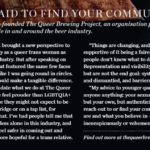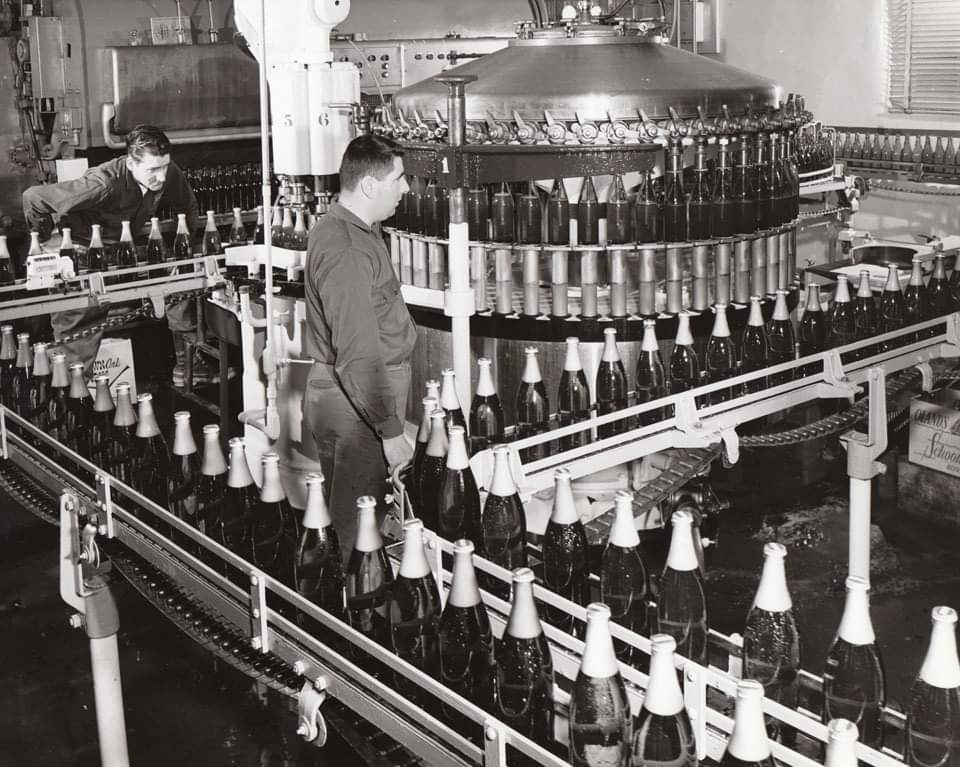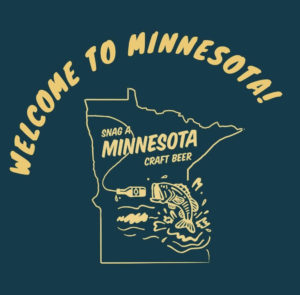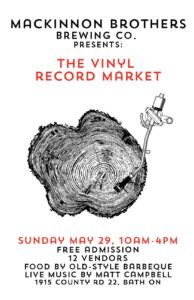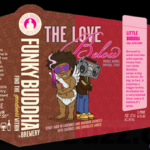Here we are. Again. Growing in wisdom. Me, I’ve been reading more books this year and keeping track. Keeping track of a lot of things. Self-improvement? Do more of this cut down on a bit of that. Twenty-seven books so far this year, not one of them about beer. Currently (after reading the highly recommended book The Shipping News,* ultimately a comedy set in a fictional version of small town Newfoundland in which beer – and screech – make appearances) I am on a third by Questlove, this one Creative Quest, an encouraging book about the creative process. I usually avoid self-help books… but then again I avoided books, too… too many law books can do that. You can help decide if it has any positive effect.**
 Martin was particularly creative in his photo work, the image right there from his post about a guitar themed pub, Northern Guitars in Leeds. Love the angle.
Martin was particularly creative in his photo work, the image right there from his post about a guitar themed pub, Northern Guitars in Leeds. Love the angle.
Just to prove I do occasionally (mostly by accident) take advice, I did take a pub tip from Chris Dyson for my second pre-gig pint in Leeds. Perhaps the pace of change has slowed a little in the east of Leeds, but the Calls District was busy enough, though Northern Guitars was only ticking over. I guess their trade comes from music nights.
For the Jubilee, the ever excellent A London Inheritance posted photos of processions, streets crowded with people and/or bunting from past royal celebrations – including a few pubs covered in banners including The George in the Strand. Some not pleased with last weekend’s events – which is fine. Here is a live action photo of the madcap goings on. We are advised by The Daily Star that the event was pretty boozy as to be expected:
The streets of Soho, in the heart of London, were lined with drinkers and Ripe in East Sussex was just one of hundreds of villages that celebrated with an open-air party. Everywhere you looked, it seemed, someone was enjoying the day. James Heale tweeted: “Horse Guards Parade. Man singing lustily in an England ‘96 shirt, six pack in one hand, fag in another. Union Jack billowing behind him, Tesco crown on his head. The lion roars”. In fact, some people appeared to be enjoying themselves a little too much.
Rooting for an Oaken Joob myself, now. That would be fun. And a bit of a surprise for those most involved. Oh, one last but not least thing – Maureen won the prize so a parcel of goodness shall be sent her way…
Now that the bunting is folded up and put away, reality strikes. First up, why is lager more expensive in London and Northern Ireland compared to other parts of Britain? Less of a puzzle, sanctions against Russia appear to be effectively stopping beer imports:
That has pressured the economy and affected the habits of Russians used to a lavish selection of foreign-made alcohol. “The beer situation is very cheerless,” said Anton, a 36-year-old IT expert who works for a state financial organisation in Moscow. “Not to mention Paulaner, Pilsner Urquell and other tasty stuff, I’m not at all confident if Russian beer is here to stay. There are problems not only with beer imports but even with imports of hops,” he added. Russian breweries depend heavily on imports of raw materials, such as hops.
Another sort of shortage is also at play as the North America is undertaking the rare step of importing malting barley to make up for a poor 2021 crop. Keep an eye on that.
In another sort of dreary news, the iconic Buffalo Bill‘s brewpub of the San Francisco Bay area is shutting – after inflicting the dubious upon us all!
Buffalo Bill’s is best known for putting pumpkin ale on the map in 1986 when Owens was inspired by the beer first enjoyed during colonial America. Owens became obsessed with crafting a modern take on pumpkin ale after learning that even President George Washington once brewed the orange-hued beer during a time when pumpkins often substituted malt. Not long after Buffalo Bill’s resurrected the polarizing beer, other brewpubs around the country began to follow suit and devised their own renditions of pumpkin ale.
Jay wrote about the original owner, Bill Owens, and the place calling it “one of California (and America’s) earliest brewpubs.” Pretty sure I had their Orange Blossom Pale Ale once, found in a NY state beer store over a decade ago. But do you think I can find the review? Who runs this place? What a mess!
Enough! Something fun.  The screenshot to the right [Ed.: my left] was grabbed from this short vid of an old pre-decimalization penny auto bot thingie – which still works. Called The Drunkards Dream. More info here, here and here.
The screenshot to the right [Ed.: my left] was grabbed from this short vid of an old pre-decimalization penny auto bot thingie – which still works. Called The Drunkards Dream. More info here, here and here.
And something uplifting. Beth Demmon has published another interesting bio of someone in beer, this time April Dove who balances her interest as a roaming brewer with her professional life as a nurse:
For now, that life means remaining a nurse. It “pays the bills,” April says, although moving into beer full-time remains the dream. The first years of working through COVID-19 left April with nightmares and PTSD. “I did things I hope I never have to do again,” she says. “I saw things I never want to see again.” But she’ll continue to invest in a future in beer, setting goals for herself like pouring one of her beers at a beer festival in the next year. Despite the challenges she’s faced, April hopes that by sharing her experiences with others who have been systemically excluded from craft beer, she’ll be able to introduce her passion to many more.
Ron‘s been on a bit of a roll in terms of writing about his experience of beer, he kissed a squirrel… errr… had a Newkie Broon this week and also featured a trip to Folkestone with Mikey:
It was at least three years since I’d last been. The longest gap, probably, ever. Well, since we started going there. Mikey went twice every year. I’d accompany him on at least one of those trips. I became weirdly fond of the place. Perhaps because of its ordinariness. And the really good chippy. Andrew asked on my return: “What did you do other than hang around in pubs and cafes?” “Nothing, really. Other than a little light shopping.” It genuinely was all breakfasts and beer. And the odd whisky.
The story goes on to end up being a neat and tidy description of two classes of pub, the pricy mini and the cheap maxi. Which makes one wonder if the lounge and the public bar have really just relocated. Boak and Bailey and their wise comment makers wrote about the gradations of such spaces exactly one yoink ago.
And there was an excellent example of Twitter as helpful tool in the form of a description – from the hand behind the Glasgow brewery Epochal – of drinking a 126 year old bottle of McEwan’s Pale Ale which was recovered from The Wallachia which sank in 1895 in the Firth of Clyde:
This one still had a good amount of carbonation. It smelled old but in a peculiarly musky, libraryish way rather than an excess of oxidation. It had a pronounced Brettanomyces character with subtle aromatic acids and miraculously retained a clear hop character, clear enough that I could have a guess that they used Fuggles and Goldings. On the palate it was very dry and still had a powerful, clear bitterness.
Connectedly, Gareth Young of Epocal was also featured in Jeff’s well researched article “Lost, Stock & Barrel: The Forgotten Funk of Old Ales” published by CB&B with this wise observation:
The flavors that marked stock ales of past centuries lacked many of the problems that can trouble mixed-culture brewing: excessive acetic acid, intense funkiness, chemical off-flavors. Instead, using what we would now call “heritage” barleys, techniques like long boils, cleansing tanks, and dry-hopping, brewers are edging back toward the refinement for which old stock ales were renowned.
You know… there is a school of beer history writing, now largely retreating in the rear view mirror fortunately, one based too heavily on supposition and assumption. We heard too often that old brewers made smoky even though there is plenty of evidence against it. Competent brewing starts in the 1800s we are told even though there is plenty of evidence against it. What really needs doing is reading some good history books.
Speaking of being in the good books, The Beer Nut is on the job this week examining if one brand extension has succeeded… and was not impressed:
The aroma is sweet and fruity: lots of very obvious hard caramel, sitting next to softer plum and raisin. The flavour is rather less complex. I was hoping that Landlord + caramel would unlock some new dimension of taste, but I could not perceive anything other than a quite hop forward English bitter — meadow blossoms and earthy minerality — spiked with thick and gloopy treacle. It’s sticky, not wholesome, and the two aspects don’t meld well together. The label promised chocolate and roasted malt, like a proper dark ale, but the flavour doesn’t deliver that.
Question: why a lottery? Why not just promote a program you create, find sponsorship for and provide for free with next level resources identified? We have so much green-washing, #MeToo and #BLM cap waving but never quite cheque sending, Ukrainian net profits only giving corporate PR under the guise of charity. The price of the Sam Adams Pride packaging alone would likely pay for the program’s costs.
Apparently, in a case of un-red-tape, the Province of Saskatchewan’s Auditor has noticed that craft brewing is not getting noticed:
…according to the provincial auditor, the province is struggling to keep pace when it comes to meeting its regulatory oversight targets. The auditor’s latest report notes that of 83 approved craft alcohol product lines, over half (43) did not have valid lab test report certificates. These certificates prove products are untainted and that their alcohol content matches the label. Saskatchewan Provincial Auditor Tara Clemett says the SLGA [Ed.: the Saskatchewan Liquor and Gaming Authority] is failing to follow up when producers fail to submit a new certificate, which is required every two years. One producer, she noted, had not provided an updated certificate more than nine months after its two-year deadline.
Craft brewers are not concerned. The best way to not be spoken about.
Finally: are we tired of discussing mild yet? No! Are we tied of The Tand winning awards? No!! Are we tired of NA bevvie trade associations? Probably.
There… a middly sort of week I’d say overall. For more, check out the updates from Boak and Bailey mostly every Saturday but not from Stan every Monday as he is on his summer holiday. Check out the weekly Beer Ladies Podcast, and at the weekly OCBG Podcast on Tuesday (Ed.: back again this week) and sometimes on a Friday posts at The Fizz as well. There is a monthly sort of round up at The Glass. (Ed.: that seems to be dead now.) There is more from DaftAboutCraft‘s podcast, too. And the Beervana podcast. And sign up for Katie’s irregular newsletter, The Gulp, too. And check out the Atlantic Canada Beer Blog‘s weekly roundup. Plus follow the venerable Full Pint podcast. And Fermentation Radio with Emma Inch. The AfroBeerChick podcast as well! And also look at Brewsround and Cabin Fever. And Ben has his own podcast, Beer and Badword (Ed.: …notice of revival of which has been given… still not on the radio dial…) And remember BeerEdge, too, and The Moon Under Water. There has also been the Beer O’clock Show but that’s now winding up after ten years.
*No, never saw the movie with Mr. Creepy in the main role. The book is excellent even if it can’t really be taken as a documentation of Newfoundland life. [It caused me to buy The Ashley Book of Knots, too, and doubt every half-hitch I make out in the garden.] Yet as in the book Newfoundlanders do, however, shoot off shotguns in their front yards in enthusiastic celebration still in some out ports. My pal, married on Fogo Island, was under attack as they were driven, post vows, about the place, from village to village. BLAM BLAM BLAM!!! Over and over. Were they in a convertible or standing in the back of a pickup? Can’t remember that bit of the story. BLAM BLAM BLAM!!!
**as Martyn helpfully did in last week’s comments.


